Young people buy antibiotics... to prevent Covid-19, refuse rapid testing despite typical symptoms
Mild fever, headache, sore throat and loss of smell - a combination of symptoms that made many people panic during the pandemic. But for Mai Thao (29 years old, living in Ho Chi Minh City), it was just a week of "mild discomfort".
About a week ago, she began to feel the first signs of health problems.
"I still go to work as usual in the morning, but around 3-4 pm my body starts to feel hot and has a slight fever," Thao said.
The symptoms lasted for two days, then progressed to a sore throat, headache, and persistent fatigue. After a coma on the third day, Thao woke up and suddenly realized she had lost her sense of smell.
"I couldn't smell anything, from coffee, food or perfume, for the next 4 days. From this sign, I was sure I had Covid-19 again even without a rapid test. But because I had received 4 vaccinations before, I was more or less calm," Thao said.
In the early days of her illness, Thao limited contact with her 2-year-old son as much as possible. When she discovered she had lost her sense of smell, she and her husband decided to send their son to his paternal grandparents' house and take care of each other until he recovered.
The following days, the young mother continued to go to work regularly, except that she took vitamin C and paracetamol when she had a severe headache. After 10 days, her health returned to normal.
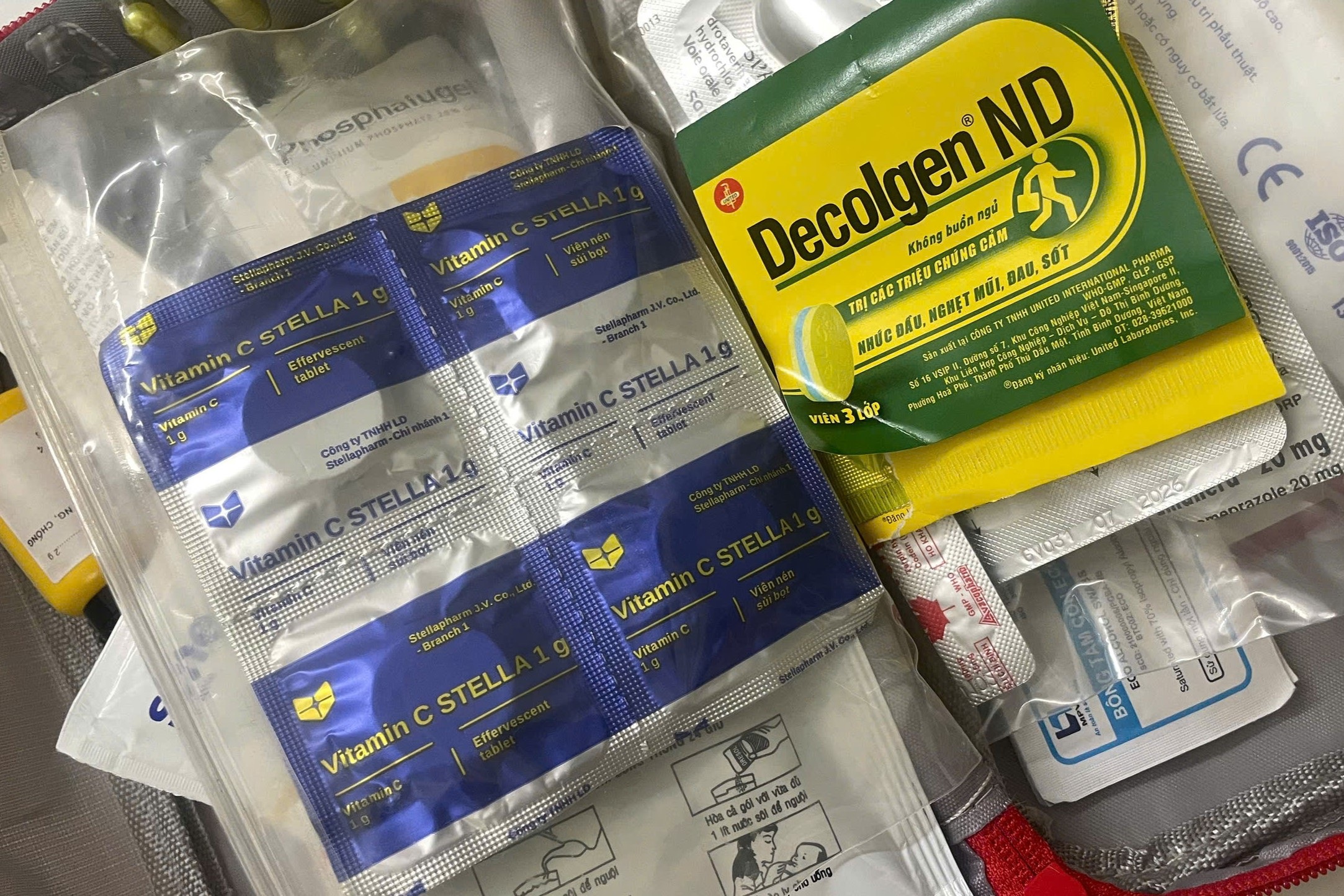
Two types of medicine Thao used for nearly 10 days when she was suspected of having Covid-19 (Photo: NVCC).
Sharing more, Thao said that 4 colleagues in her group also experienced the same situation, except that they did not lose their sense of smell. They all handled it the same way: treating it as a cold, drinking orange juice, taking medicine when needed, and continuing their work.
"None of us initially tested quickly, except for one person with congenital heart disease who bought a rapid test kit and tested positive on the third day of illness. However, because he had no worsening symptoms, he only asked to work remotely and self-monitor his health at home," Thao said.
While many young people in Vietnam like Mai Thao have begun to "live with" Covid-19 easily, in China, Nam Thuong (25 years old, a Vietnamese student studying abroad in Shanghai) has completely different concerns.
After hearing about the new outbreak in many countries, Thuong was confused and planned to ask her relatives to buy antibiotics and send them to her just in case. Her seemingly "careful" intention quickly met with strong reactions from her close friend who is a nurse in Ho Chi Minh City.
"My friend scolded me directly: 'Covid-19 is a virus, taking antibiotics has no effect and can harm the body, make the body resistant to drugs, and damage the liver and kidneys'. Hearing that, I was startled," Thuong admitted. At that time, she simply thought of taking antibiotics to cure a sore throat if she was infected.
Nam Thuong's story is a reminder that fear can sometimes lead us to act in the wrong way. In these times, understanding the disease is as important a "cognitive vaccine" as medicine.
Should I get a rapid test and take antibiotics if I suspect I have Covid-19?
Sharing with Dan Tri, Associate Professor, Dr. Tran Van Ngoc, Chairman of the Ho Chi Minh City Respiratory Association, commented that the current Covid-19 variant is Omicron XEC, which spreads quickly but has low toxicity so it does not pose a danger to the community.
"In Vietnam, Covid-19 has long been downgraded to a group B infectious disease, on par with the flu, and community immunity is relatively good. Therefore, people should consider Covid-19 a common seasonal disease, avoiding unnecessary panic," said this expert.
According to Associate Professor Ngoc, in the current context, people should not rush to buy Covid-19 rapid test kits for use. Testing depends on individual conditions and is not a mandatory recommendation.
"For young people, in good health, with mild symptoms that only last a few days, rapid testing is not really necessary at this time," he explained.
However, rapid testing is very important when you live with high-risk groups such as young children, pregnant women, people with underlying diseases or immunodeficiency diseases. At this time, Covid-19 testing helps to quickly determine the infection status, thereby limiting contact with this group to avoid spreading the virus to them.
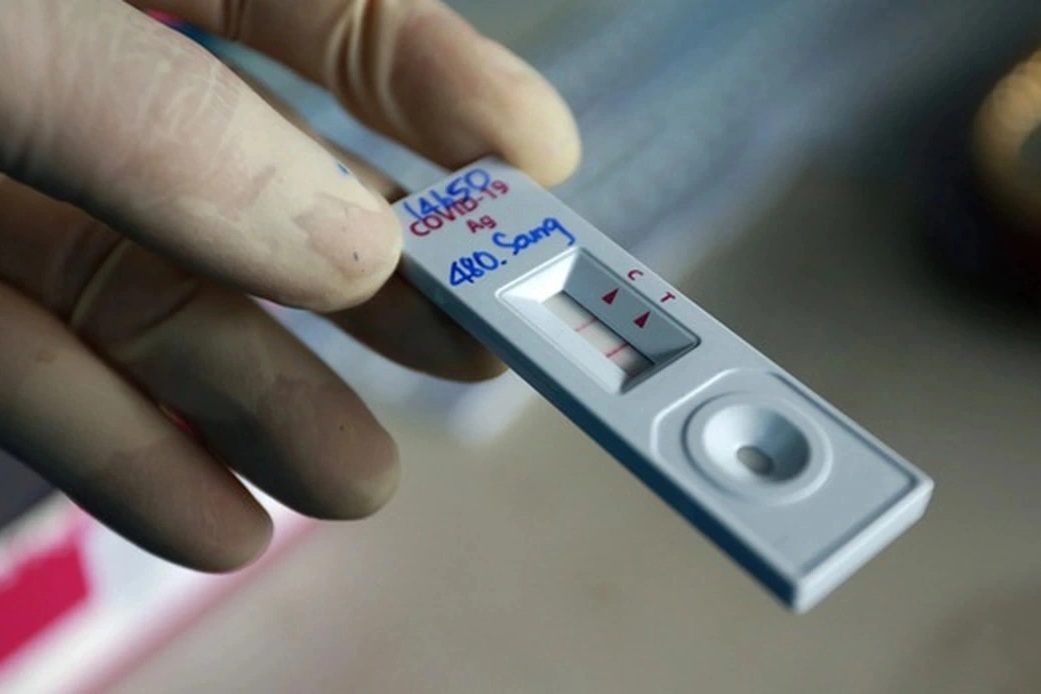
In the current context, rapid testing for Covid-19 when suspected of having the disease is not too important. (Photo: Hai Long).
According to Associate Professor Ngoc, elderly people with flu at this time should also go to a medical facility for early diagnosis and timely treatment.
In addition, the Chairman of the Ho Chi Minh City Respiratory Association also recommended that people absolutely do not arbitrarily use antibiotics or corticosteroids to treat Covid-19.
"Antibiotics are completely ineffective in treating Covid-19, sometimes causing additional side effects to the body and contributing to increasing antibiotic resistance," Associate Professor Ngoc emphasized.
Antibiotics should only be used as prescribed by a doctor when there is a bacterial infection or co-infection.
In addition, corticosteroids also pose many dangers if abused. The drug has the effect of reducing inflammation, but when used arbitrarily, it will affect and harm health.
Instead, people should only use drugs to treat common symptoms such as fever, sore throat, runny nose...
To limit the possibility of getting sick, the expert recommends that people wear masks when going to crowded places, wash their hands regularly, and avoid contact with people showing signs of flu.
People with underlying diseases such as high blood pressure, cardiovascular disease, diabetes... need to control their diseases well to avoid complications when unfortunately infected with the virus.
In addition, people should increase their resistance and overall health by eating a well-balanced, nutritious diet, especially supplementing with vitamin C, and exercising regularly.
In case of suspected Covid-19, Associate Professor Ngoc recommends that mild cases (young people, good health, no underlying diseases, mild symptoms) should be cared for as if they had a common cold.
Accordingly, you should only treat to reduce symptoms, increase vitamin supplements, especially vitamin C, to increase resistance, and can rest at home for a few days.
Elderly people or those with underlying medical conditions, or at-risk groups, when showing signs of illness (such as flu), should see a doctor early to determine the cause of the illness and have a timely treatment plan.
At a press conference held by the Propaganda and Mass Mobilization Committee of the City Party Committee in coordination with the Department of Culture and Sports of Ho Chi Minh City on May 22, Ms. Le Hong Nga, Deputy Director of the Ho Chi Minh City Center for Disease Control, said that as of the end of May 18, the city had recorded a total of 79 Covid-19 cases.
This figure is much lower than the same period last year, but the number of infections has been on an upward trend in recent weeks.
In addition, the Omicron XEC strain is not a new variant. This variant has been detected in the world since June 2024. This strain is now present everywhere in the world, classified by the World Health Organization (WHO) as a low-risk variant that needs to be monitored.
The Ho Chi Minh City health sector has also planned to closely coordinate monitoring and preventing the Covid-19 epidemic, ensuring the fastest response.
Source: https://dantri.com.vn/suc-khoe/chuyen-gia-chi-ra-nhung-hieu-lam-tai-hai-khi-nghi-mac-covid-19-20250523021453703.htm



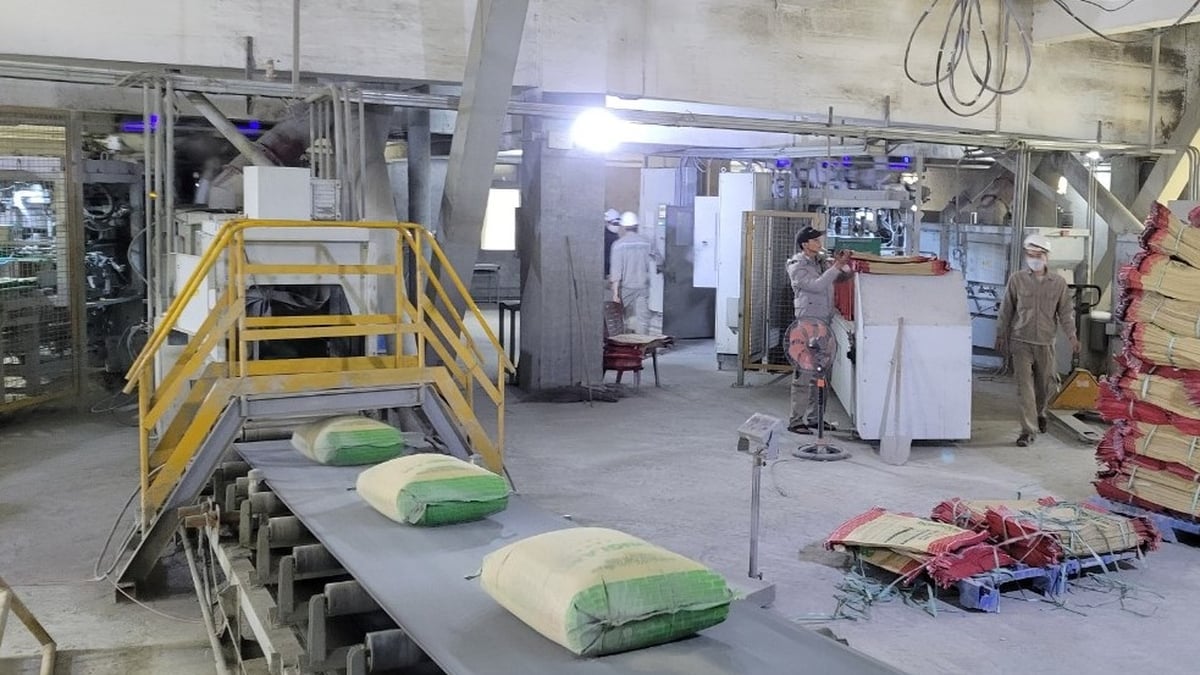




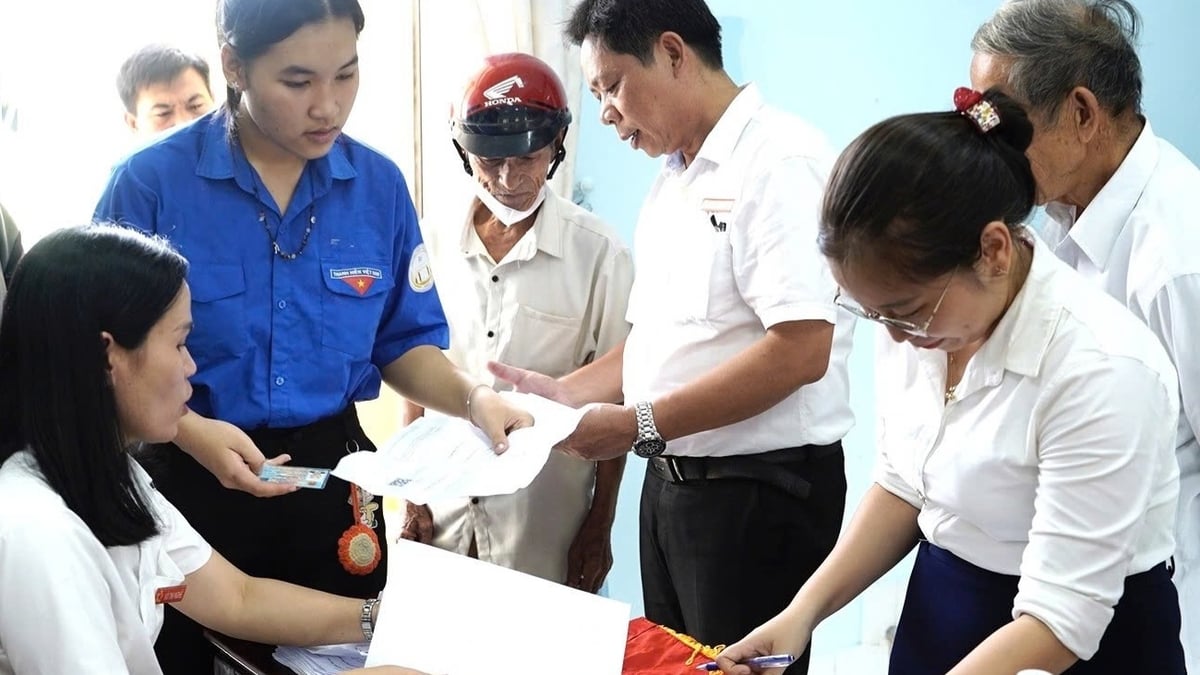
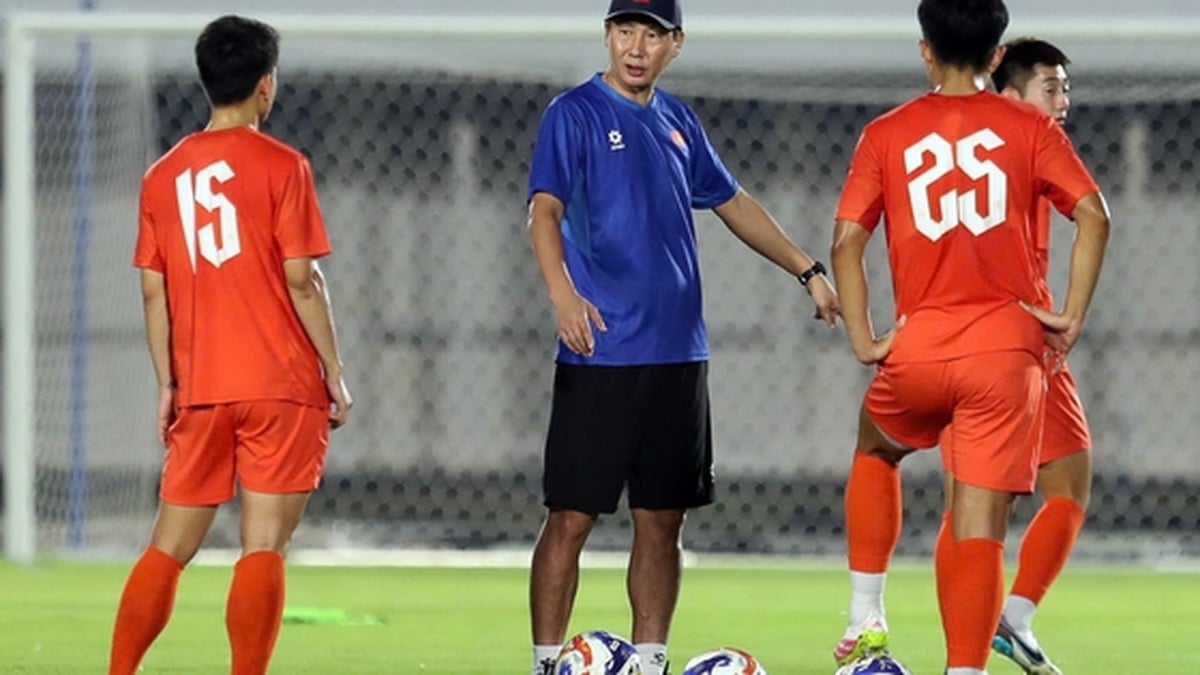















![[Photo] National Assembly Chairman attends the seminar "Building and operating an international financial center and recommendations for Vietnam"](https://vphoto.vietnam.vn/thumb/1200x675/vietnam/resource/IMAGE/2025/7/28/76393436936e457db31ec84433289f72)









































































Comment (0)